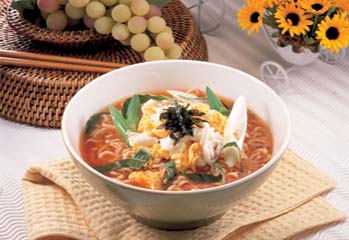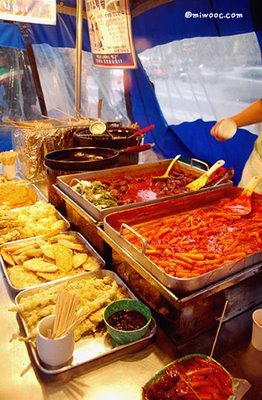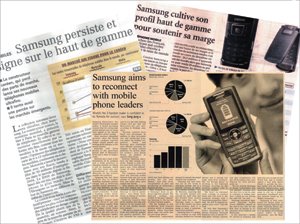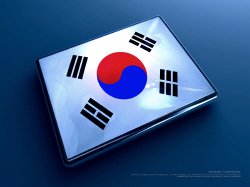A Poisonous Apple Tastes Better.
 'Myeon' is a Korean word that contains all types of thin and long flour-made food also known as 'noodle' or 'vermicelli', etc.
'Myeon' is a Korean word that contains all types of thin and long flour-made food also known as 'noodle' or 'vermicelli', etc.
People say that Korea, China, Japan have their original way to make myeon from kneading(dough). Korea slices, China lengthens, and Japan pulls out. By the way, in Korea, 2 misterious myeon foods made without slicing--a Korean way to make myeon--are Koreans' favorites.
One is Jajangmyeon. I might say every Korean calls it a representative Chinese food. Because it has been selling only in Chinese restaurants in Korea, and Jajang is a sort of Chinese sauce. However, there hasn't been the very Jajangmyeon in China for real--recently news said some Koreans started Jajangmyeon business in China. According to Encyber, Jajangmyeon was initially invented in Incheon, Korea. Also Wikipedia has more about it.
The other is Ramyeon. Mass media have told Korean people to know that Ramyon came from Japan's 'Ramen'. But at the same time, they have delivered news about Korean Ramyeon with a particular market share in Japan due to its different style from Ramen's.
These two don't have only one thing in common that 'imported in a way, but evolved to an originality', but also have the other common point that they are asked to sit at the table with an arguable issue of 'health'.
Last week, a TV show insisted Jajangmyeon has a great deal of MSG(Monosodium L-Glutamate) which can cause an imbalance of human immune system. Right after the show, the audience started talking, arguing about it on the Internet.If Jajangmyeon is a student of the school named 'arguments', Ramyeon is already a graduate. there is a longer story about Ramyeon's MSG, artificial flavors, chemical seasonings, industrial suet(beef oil) use, etc.
At the end of those arguments over Jajangmyeon and Ramyeon, I might have a conclusion they are not that good for my health. However, I find myself still loving them regardless of how they are bad for our health. Because I eat them not when I want to be healthy, but when I want to feel pleasure with extremely great taste. In other words, for Jajangmyeon and Ramyeon, if they taste great, that's it.
I don't expect my friends to be rich or looking nice at all. They are just my friends.Likewise, I don't expect Jajangmyeon and Ramyeon to be good for my health at all. They are just my friends--not too often for my health, though.



 ) for Korean expressions of foreign languages based on alphabets in Korean, due to Koreans using just one mother tongue. I know the system has had various issues related with all around Korea, among scholars and citizens. So I will talk about a little 'chaos' around certain pronunciations and expressions.
) for Korean expressions of foreign languages based on alphabets in Korean, due to Koreans using just one mother tongue. I know the system has had various issues related with all around Korea, among scholars and citizens. So I will talk about a little 'chaos' around certain pronunciations and expressions. ', they think it is Busan. However, when Americans listen to the sound of Koreans reading '
', they think it is Busan. However, when Americans listen to the sound of Koreans reading ' ' and '
' and ' ' are bilabial (two-lip) consonants. Koreans tell one from the other owing to if it is
' are bilabial (two-lip) consonants. Koreans tell one from the other owing to if it is  [
[ usan] as well as
usan] as well as  [taegu] is not
[taegu] is not  [
[ aegu].
aegu]. ) was released in July 2000. it substituted Busan and Daegu for Pusan and Taegu. Koreans got to feel comfortable. However, English speakers could not only find any 'voiced [b]' from that 'Busan', but also voiced [d] from Daegu.
) was released in July 2000. it substituted Busan and Daegu for Pusan and Taegu. Koreans got to feel comfortable. However, English speakers could not only find any 'voiced [b]' from that 'Busan', but also voiced [d] from Daegu.






